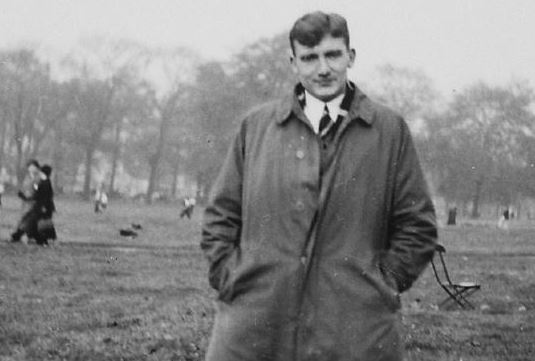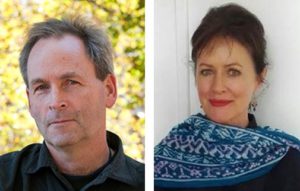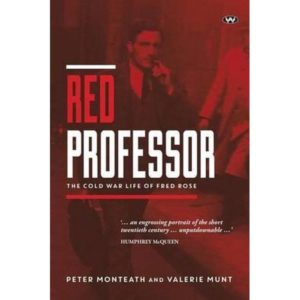
A gripping tale about the controversial Cold War life of communist and early Australian indigenous anthropologist Fred Rose has put The Red Professor in the shortlist for a 2016 Prime Minister’s Literary award.
Exhaustive research by Flinders historians Professor Peter Monteath and affiliate lecturer Dr Valerie Munt, from the School of History and International Relations, has seen the Wakefield Press book gain attention in high circles.
Controversial insights into the Labor Party and Communist Party of Australia (CPA) in the 1950s are revealed. This includes Rose’s close association with the CPA’s so-called spymaster Wally Clayton and the Petrov Royal Commission, as well as contacts with ALP politicians including Gough Whitlam, senator George Georges, minister Gordon Bryant and senior public servant ‘Nugget’ Coombs.
Despite being questioned in the Petrov Royal Commission over suspicions that he was the agent code-named ‘The Professor’, Rose’s suspected role in Australia’s 1950s Soviet spy ring was never conclusively established.

The Red Professor concludes that Rose’s close association with the key figures exposed by the Petrov affair, including Wally Clayton, make the accusations of spying highly plausible.
“It’s very likely that he was part of the communist network that was passing information on to the Soviets,” Professor Monteath says.
In addition to interviewing members of Rose’s family and former lovers, colleagues and friends, the authors undertook archival research in Australia and former East Germany to document Rose’s fascinating if turbulent life. They also had the benefit of Rose’s own version of events up until the mid-1950s in the form of his half-finished memoirs.
Few people can have a CV to rival Fred Rose’s: Cambridge University graduate, remote area meteorologist, Groote Eylandt anthropologist, alleged Soviet spy, eminent East German academic and later a Stasi informant.
London-born into a conservative if humble family, Rose was educated at Cambridge in the 1930s – there is no evidence he had any contact with the university’s notorious hotbed of Soviet sympathisers – before migrating to Australia with an ambition to pursue a career in anthropology. On arrival, he took up a public service job as a meteorologist, which provided a living and also took him to remote areas including Groote Eylandt, where, in his spare time, he conducted much of his field work.
 The contact heightened Rose’s consciousness of social injustice, and the systemic racism and neglect suffered by Australia’s Aboriginal people was a key contributor to his adoption of communism.
The contact heightened Rose’s consciousness of social injustice, and the systemic racism and neglect suffered by Australia’s Aboriginal people was a key contributor to his adoption of communism.
Rose’s job took him to wartime Melbourne and then on to Canberra, where his left-wing connections, including Clayton and Katharine Prichard, led to ASIO surveillance and his eventual implication in the Soviet spy scandal. He left Australia in 1956, joining his wife Edith to live in communist East Germany, where he became a prominent academic, and also an informant for the Stasi, the state secret police.
Rose continued to visit Australia throughout the 1960s and 1970s, but governments of both persuasions remained hostile towards him, and his wish to return permanently was unfulfilled.
Rose died in 1991, perhaps fittingly just after German reunification.
“It was a life very much shaped by the ideologies of the 20th century,” Professor Monteath says.
Beyond his Petrov notoriety, Rose was a talented academic and pioneering anthropologist, but also a womaniser.
“He was a tall, handsome, charming man of considerable charisma.”
In Canberra on 8 November, the PM’s Literary Award for Australian history was shared by Geoffrey Blainey (The Story of Australia’s People: The Rise and Fall of Ancient Australia) and Suzanne Rutland and Sam Lipski (Let my people go: the untold story of Australia and the Soviet Jews 1959–89).
The judges said the “engrossing biography” of Fred Rose features “thorough and relentless research, including access to ASIO files and the Stasi files of East Germany’s notorious secret police”.
Finalists in the PM’s Prize for Australian History
- The Story of Australia’s People. The Rise and Fall of Ancient Australia, Geoffrey Blainey AC (Penguin)
- Let My People Go: The untold story of Australia and the Soviet Jews 1959-89, Sam Lipski and Suzanne D. Rutland (Hybrid Publishers)
- Red Professor: The Cold War Life of Fred Rose, Peter Monteath and Valerie Munt (Wakefield Press)
- Ned Kelly: A Lawless Life, Doug Morrissey (Connor Court Publishing)
- The War with Germany: Volume III—The Centenary History of Australia and the Great War, Robert Stevenson (Oxford University Press)
A Fellow of the Alexander von Humboldt Foundation, Professor Monteath is also an author of POW: Australian Prisoners of War in Hitler’s Reich (Pan Macmillan 2011) and Interned: Torrens Island 1914–1915 (Wakefield Press 2014). Dr Munt completed her Honours and PhD studies in history at Flinders University.
For more information about the shortlisted books and the Prime Minister’s Literary Awards, visit www.arts.gov.au/pmla or www.facebook.com/pmliteraryawards/.

